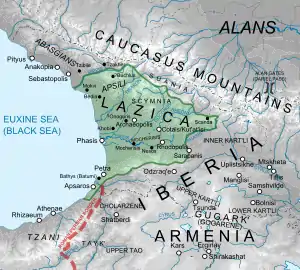Damnazes
Damnazes (Georgian: დამნაზე; Greek: Δαμνάζης; died 522[1]) was a 6th-century king of Lazica (western Georgia), a contemporary of the Sassanid king of Iran Kavadh I. Damnazes, like other kings of Late Antique Lazica, are mentioned by the contemporary chronicles in the context of the rivalry between the Eastern Roman (Byzantine) Empire and Sassanid Iran in the Caucasus.
| Damnazes | |
|---|---|
| King of Lazica | |
| Reign | ? – 522 |
| Successor | Tzath I |

Damnazes is known to the Byzantine historian John Malalas[2] as the father and predecessor of Tzathius, king of the Lazi. The anonymous Chronicon Paschale (Chron. Pasch. s.a. 522) renders his name as Zamnaxes.[1] According to a genealogical hypothesis by Professor Cyril Toumanoff, Damnazes might have been a son of the Lazic king Gubazes I, who is known to have had his son as co-ruler c. 456.[3]
Damnazes was a subject of the Sassanid king and, although ruling over a Christian country, professed Zoroastrianism.[4] On his death, his son and successor, Tzathius, rejected an Iranian coronation and repaired to Constantinople to have his accession validated by the Byzantine emperor Justin I.[4]
References
- Martindale, Jones & Morris 1980, p. 344.
- Joh. Mal. 413.
- Toumanoff 1980, pp. 81–82.
- Toumanoff 1980, p. 79.
Sources
- Martindale, John Robert; Jones, Arnold Hugh Martin; Morris, J., eds. (1980). The Prosopography of the Later Roman Empire, Volume II: A.D. 395–527. Cambridge, United Kingdom: Cambridge University Press. ISBN 978-0-521-20159-9.CS1 maint: ref=harv (link)
- Toumanoff, Cyril (1980). "How Many Kings Named Opsites?". In Coddington, John Insley; Thompson, Neil D.; Anderson, Robert Charles (eds.). A Tribute to John Insley Coddington on the Occasion of the Fortieth Anniversary of the American Society of Genealogists. Association for the Promotion of Scholarship in Genealogy.CS1 maint: ref=harv (link)
| Preceded by Gubazes I ? |
King of Lazica fl. 522 |
Succeeded by Tzath I |